Related Research Articles

Rāmāyana is one of the two major Sanskrit epics of ancient India and important text of Hinduism, the other being the Mahābhārata.

Ravana was a king of the island Lanka and the chief antagonist in the Hindu epic Ramayana and its adaptations.

Rakshasa, while female rakshasa are known as a rakshasi, is a adjective for cannibalistic beings in Hinduism, Buddhism and Jainism. Rakshasas are also called "man-eaters". Rakshas is also used to describe Asuras, which are power seeking deities that lack divinity. They are often depicted as antagonists in Dharmic religious scriptures.

Hanuman is a Hindu god and divine vanara (monkey) companion of the god Rama. Hanuman is one of the central characters of the Hindu epic Ramayana. He is an ardent devotee of Rama and one of the chiranjivis. Hanuman is also son of the wind-god Vayu, who in several stories played a direct role in Hanuman's birth. Hanuman is mentioned in several other texts, such as the epic Mahabharata and the various Puranas.

Kubera also known as Kuvera, Kuber or Kuberan, is the god of wealth and the god-king of the semi-divine Yakshas in Hindu culture. He is regarded as the regent of the North (Dik-pala), and a protector of the world (Lokapala). His many epithets extol him as the overlord of numerous semi-divine species and the owner of the treasures of the world. Kubera is often depicted with a plump body, adorned with jewels, and carrying a money-pot and a club.
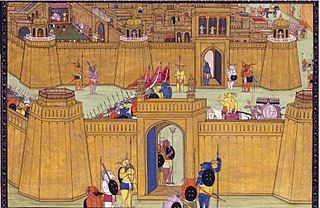
Lanka is the name given in Hindu epics to the island fortress capital of the legendary asura king Ravana in the epics of the Ramayana and the Mahabharata. The fortress was situated on a plateau between three mountain peaks known as the Trikuta Mountains. The ancient city of Lankapura is said to have been burnt down by Hanuman. After its king, Ravana, was killed by Rama with the help of Ravana's brother Vibhishana, the latter was crowned king of Lankapura. The site of Lankā is identified with Sri Lanka. His descendants were said to still rule the kingdom during the period of the Pandavas. According to the Mahabharata, the Pandava Sahadeva visited this kingdom during his southern military campaign for the rajasuya of Yudhishthira.

In the Hindu epic Ramayana, Maricha, or Mareecha is a rakshasa (demon), who was killed by Rama, the hero of the epic and an avatar of God Vishnu. He is mentioned as an ally of Ravana, the antagonist of the epic. His most notable exploit is his role in the kidnapping of Sita, Rama's wife. His son Kalanemi was killed by Hanuman.

In Hindu mythology, Vānara either refers to the monkeys or a race of forest dwelling people In the epic the Ramayana and its various versions, the Vanaras help Rama defeat Ravana. They are generally depicted as humanoid apes or monkeys.
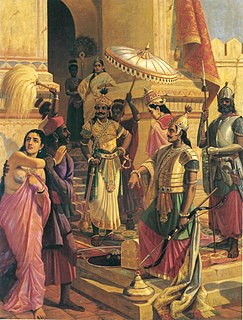
Indrajit or Meghanada, according to Hindu texts, was a prince of Lanka and possessor of Indra Loka (Heaven). He is regarded as one of the greatest warriors in Hindu texts. He was mentioned in the Indian epic Ramayana. Indrajit played an active role in the great war between Rama and Ravana. He acquired many kinds of celestial weapons from his Guru Shukra. He defeated the Gods (Devas) in heaven. Using Brahmastra, Indrajit killed 670 million Vanaras in a single day; nearly exterminating the entire half vanara race. No warrior on the Earth had ever achieved this statistical feat before in the Ramayana.
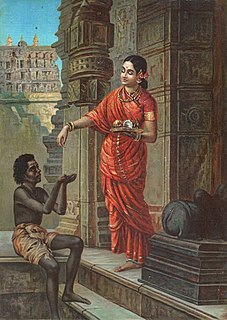
Mandodari was the queen consort of Ravana, the king of Lanka, according to the Hindu epic Ramayana. The Ramayana describes Mandodari as beautiful, pious, and righteous. She is extolled as one of the Panchakanya, the recital of whose names is believed to dispel sin.
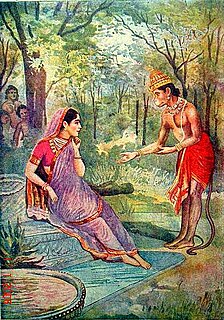
Sundara Kaanda (IAST: Sundara Kāṇḍa, Sanskrit: सुन्दरकाण्ड {beautiful episode}, is the fifth book in the Hindu epic, the Ramayana. The original Sundara Kanda is in Sanskrit and was composed by Valmiki, who was the first to scripturally record the Ramayana. Sundara Kanda is the only chapter of the Ramayana in which the hero is not Rama, but rather Hanuman. The work depicts the adventures of Hanuman and his selflessness, strength, and devotion to Rama are emphasized in the text. Hanuman was fondly called “Sundara” by his mother Anjani and Sage Valmiki chose this name over others as the Sundara Kanda is about Hanuman's journey to Lanka.

Shiva Tandava Stotra is a Sanskrit stotra (hymn) that describes Shiva's power and beauty. It is traditionally attributed to Ravana, the King of Lanka, who is considered to be a great devotee of Shiva. It is believed that Ravana composed the hymn in praise for Shiva, and pleading for moksha.
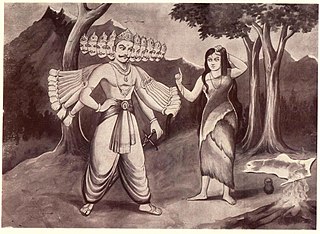
In Hindu mythology, Vedavati (Sanskrit:वेदवती) is speculated to have been the spirit of Sita Devi, the wife of Lord Rama in the epic Ramayana. She was another avatar of Devi Lakshmi.

Shurpanakha, also known as Meenakshi, is a Rakshasi (demon) in Hindu mythology. Her legends are mainly narrated in the epic Ramayana and its other versions. She was the sister of Lanka king, Ravana, and the daughter of the sage Vishrava and Rakshasi Kaikeshi. Shurpanakha's role in the original epic is small yet significant.
In Hindu mythology, Pulastya was one of the ten Prajapati or mind-born sons of Brahma, and one of the Saptarishis in the first Manvantara. Pulastya was born from the Karṇa—ear—of Brahmā.. while other source states- Pulastya (पुलस्त्य) was created as a Sādhaka (aspirant) by Brahmā out of his vital breath named Udāna, according to the Śivapurāṇa 2.1.16.
Vishrava was the son of Pulastya, the brother of celebrated sage Agastya Muni and the grandson of Brahma, the Creator, and a powerful Rishi as described in the great Hindu scripture epic Ramayana of Ancient India. A scholar par excellence, he earned great powers through Tapasya, which in turn, earned him great name and fame amongst his fellow Rishis. Bharadwaja, in particular, was so impressed with Vishrava that he gave him his daughter, Ilavida, in marriage. Ilavida bore Vishrava a son, Kubera, the Lord of Wealth and the original ruler of Lanka.
In the Hindu epic Ramayana, the Chandrahasa is an indestructible sword that Lord Shiva gifts Ravana. It is also believed that it was given to Shivaji Maharaj by the goddess Bhavani in Tulja Bhavani Temple to fight the evil kings.
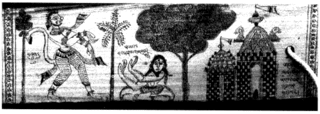
Kalanemi is a rakshasa (demon) mentioned in various adaptations of the Hindu epic Ramayana. He is the son of Maricha, who was tasked by Ravana, the epic's main antagonist to kill Hanuman. Although not part of Valmiki Ramayana, his encounter with Hanuman has been described in several versions ,but at last he was defeated by lord Hanuman.
References
- ↑ Williams, George M. (2008). Handbook of Hindu Mythology. OUP USA. p. 68. ISBN 9780195332612.
- ↑ Parmeshwaranand, Swami (2001). Encyclopaedic Dictionary of Puranas, Volume 1. Sarup & Sons. p. 124. ISBN 9788176252263.